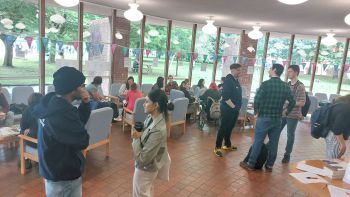Breaking the stereotypes: what it’s really like as a mature student
By: Sarah Andrews
Last updated: Tuesday, 6 May 2025

For many students returning to education in their twenties or later in life, stepping into their first seminar is a daunting experience. Surrounded by younger peers who seem to navigate discussions with ease, it’s easy to wonder: Do I really belong here? The stereotype that mature students struggle to fit in, keep up, or engage socially persists, but the reality is far more complex. In this article, Student Connectors Dharma Seneviratne and Drew Dorton challenge these misconceptions and highlight the unique strengths mature students bring to university life.
Social Integration
By Dharma Seneviratne
One of the more pervasive stereotypes about mature students is that we exist on the fringes of university life; too busy, too old, or too different to truly integrate with the campus community. Walking into the Stanmer Court during my first week, I felt this acutely. The sea of young faces engaged in conversations about accommodation parties and freshers' events made me question whether I'd find my place here.
What I've discovered is a much more nuanced reality. Yes, the social experience is different, but different doesn't mean inferior. While I may not be queuing for nightclub entry at 11pm on a Tuesday, I've found connection in ways I hadn'tanticipated. Study groups have become something of a townhall, where discussions often extend beyond coursework into shared experiences and mutual support. These relationships might not look like traditional student friendships, but they offer something equally valuable: peers who understand the unique challenges of balancing multiple life commitments while pursuing education.
A real surprise has been the welcome from younger students - while there's occasionally awkwardness, most are curious and inclusive. I've had peers tell me that having people with different life experiences in seminars makes discussions so much more interesting.
I've learned that mature students don't just fit into existing social structures, we actively reshape them. We bring diversity of thought, experience, and perspective that enriches the university community as a whole. Our presence transforms seminars from theoretical exercises into rich exchanges grounded in real-world application. We ask different questions, challenge assumptions, and connect ideas across disciplines and life experiences in ways that benefit everyone's learning.
This is echoed by research from the NUS [1], which found that mature students often form deep connections with fewer people, rather than wide but shallow social networks, and these connections frequently cross age boundaries, challenging the assumption that students naturally segregate by age.That's not to say there aren't challenges - university events scheduled late in the evening, societies that assume members have unlimited free time, and social activities centered around drinking culture can still create barriers. But the university is gradually recognizing these issues and developing more inclusive approaches to student life, like afternoon networking events, family-friendly gatherings, and interest groups that accommodate diverse schedules.
We're not isolated outliers. Mature students contribute to a richer, more diverse university culture. We may navigate social integration differently, but in doing so, we're helping to create more inclusive institutions that better reflect the world beyond campus walls.
More than just a balancing act: how mature students turn challenges into strengths
By Drew Dorton
As a mature student parent, my schedule is a delicate balancing act. Mornings start early with my babbling baby, and my days are filled with a constant juggling act of last-minute readings, quick coffee dashes, and parenting responsibilities that inevitably disrupt even the most carefully planned study schedules. By the time I finally sit down to work in the evening exhaustion is unavoidable - but procrastination isn’t an option: deadlines don’t wait for naps or work schedules.
Yet, despite challenges like these, a report by the higher education funding council for England (HEFCE) found that mature students can sometimes perform better during their studies [2]. Let's explore this further. There’s a stereotype that mature students struggle to keep pace with university demands, but in reality, the challenges we face force us to become highly efficient. Unlike younger students who might pull 2-3 all-nighters in a row or write essays at the last minute, we don’t have that luxury. Instead, we plan weeks in advance, break assignments into manageable tasks, and maximize every available moment. Time management isn’t just a useful skill for us - it's a necessity.
Many of us have also returned to education after years of professional or personal experience, meaning we often approach our studies with a sense of purpose that younger students might still be developing. While they’re adjusting to independence, we’ve already learned how to navigate responsibilities, prioritize our time, and manage competing demands. These skills don’t just help us survive university - they help us thrive.
Rethinking what it means to be a mature student.
The stereotype of the struggling mature student ignores the reality of our experiences. Yes, we face challenges, but we also bring invaluable strengths—resilience, discipline, and a strong sense of purpose. We’re not just trying to keep up; we’re thriving and making university work for us in ways that give us an edge. Our perspectives enrich discussions, our resilience strengthens academic communities, and our discipline and motivation often translate into better outcomes. Universities benefit from our presence, and the skills we develop balancing education with life’s many responsibilities set us up for long-term success. Rather than viewing maturity as a barrier, I recognize it for what it really is; an advantage and I hope many others after reading this see it that way as well.
Drew Dorton and Dharma Seneviratne form part of the Mature Student Community Connector team, working in partnership with Student Engagement & Enhancement to develop the Mature Students’ Community programme of support. For more information about our remaining events this year, visit our TicketTailor page, email SEE@Sussex.ac.uk, follow @SussexUniSEE on Instagram, or look out for our new Canvas page in September 2025.
